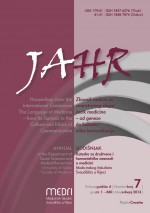When Latin gets sick: mocking medical language in macaronic poetry
Abstract
Macaronic poetry is a curious cultural phenomenon, having originated in classical antiquity and taken its standard form in the 15th century in northern Italy. Its basic feature is mixing of linguistic varieties for a humorous effect. In this paper, connections between macaronic poetry and the language of medicine have been observed at three levels. Firstly, starting with the idea of language as a living organism, in particular Latin (Renaissance language par excellence), its illness, from a humanist point of view, brought about by uncontrolled contamination with vernacular, serves as a stimulus for its parodying in macaronic poetry; this is carried out by sys-tematically joining together stable, "healthy", classical material with inconsistent, "contagious" elements of the vernacular. Secondly, a macaronic satire of quackery, Bartolotti’s Macharonea medicinalis, one of the earliest macaronic poems, is analysed. Finally, linguistic expressions of anatomical and pathological matter in macaronic poetry are presented in some detail, as in, for example, the provision of a disproportionately high degree of scatological and obscene content in macaronic texts, as well as a copious supply of lively metaphors concerning the body, and parodical references to medical language that abound. Furthermore, anatomical representations and descriptions of pathological and pseudo-pathological conditions and medical procedures are reviewed as useful as displays of cultural matrices that are mirrored in language.
Downloads
Published
Issue
Section
License
Authors who publish with this journal agree to the following terms:
- Authors retain copyright and grant the journal right of first publication with the work simultaneously licensed under a Creative Commons Attribution License that allows others to share the work with an acknowledgement of the work's authorship and initial publication in this journal.
- Authors are able to enter into separate, additional contractual arrangements for the non-exclusive distribution of the journal's published version of the work (e.g., post it to an institutional repository or publish it in a book), with an acknowledgement of its initial publication in this journal.
- Authors are permitted and encouraged to post their work online (e.g., in institutional repositories or on their website) prior to and during the submission process, as it can lead to productive exchanges, as well as earlier and greater citation of published work (See The Effect of Open Access).



